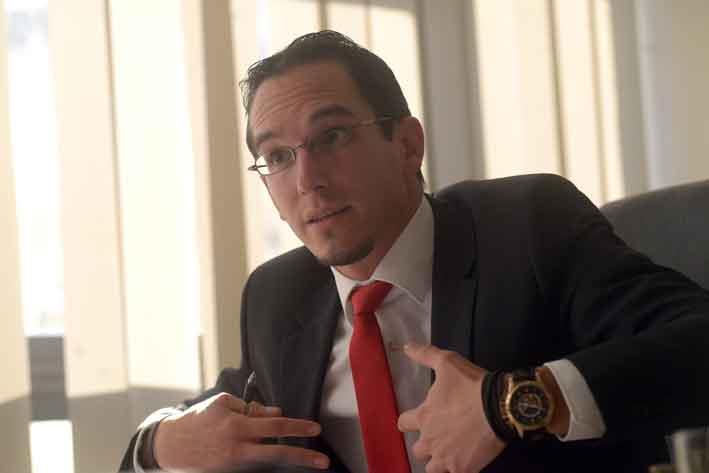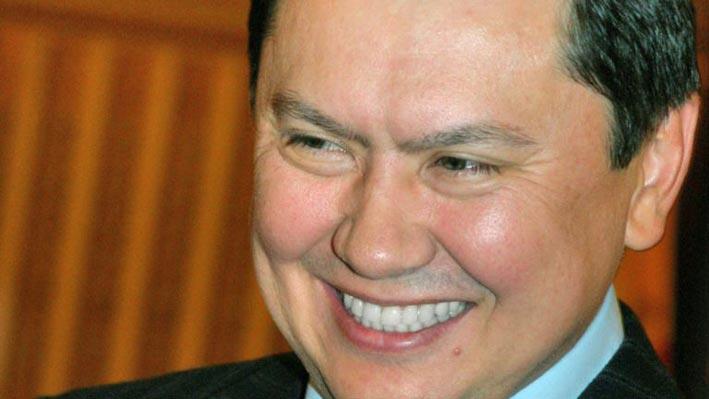“Saying I am not convinced is not enough… I am definitely sure that it was not a suicide,” Austrian lawyer Erich Gemeiner maintained about his client’s untimely end.
His client is Rakhat Aliyev, a Kazakh ex-diplomat who had called Malta his home for a number of years, and who was found hanged in his cell on 24 February, 2015 while awaiting trial on the murder of two Kazakh bankers.
But Dr Aliyev’s lawyers – and his widow Elnara Shorazova, an Austrian national of Kazakh origin – are adamant that he was either killed or forced to commit suicide.
Dr Gemeiner, who is one of the lawyers presently handling the case on Ms Shorazova’s behalf, insisted that Dr Aliyev was not suicidal, describing him as a cheerful person “who could not have done this to his family.”
He said that Dr Aliyev was far from ready to give up, stating that he was looking forward to using the trial to clear his name.
And also, he insisted, to stand up against Kazakh President Nursultan Nazarbayev and his regime, which Dr Aliyev maintained had blamed him for the murders and other alleged wrongdoing after he became a fierce critic of the regime.

From regime insider to prominent critic
For a long time, however, Dr Aliyev had been a part of this regime.
Between 1983 and 2007, he had been married to Dariga Nazarbayeva, the eldest daughter – and, for a time, heir-apparent – of Mr Nazarbayev, who has led Kazakhstan since 1989, two years before its independence from the Soviet Union.
Over the years, Dr Aliyev served as chief of Kazakhstan’s tax police, deputy chief of its security service and a first vice foreign minister. He was on his second tour as Kazakhstan’s ambassador in Austria when his fall-out with Mr Nazarbayev became definite in 2007: he was relieved of his post and stripped of his diplomatic immunity.
He had taken over Kazakh bank Nurbank that same year, and shortly afterwards, two senior officials of the bank disappeared.
In January 2008, he was convicted in absentia of kidnapping, treason and plotting a coup against the president, and sentenced to a 40-year jail term. The discovery of the two bankers’ bodies in 2011 led Kazakh authorities to accuse him of murder.
He has faced other allegations – including the torture of two bodyguards of a Kazakh opposition politician in 2001, the murder of another opposition politician in 2006 and the death of an alleged lover in 2004.
But Dr Gemeiner insisted that these allegations were simply the regime’s way of getting back at Dr Aliyev, stating that he was convinced that his client would have been acquitted of all charges. Dr Gemeiner had represented Dr Aliyev in his application for asylum in Austria, and he said that this application would have likely been approved immediately after his acquittal.
“Dr Aliyev was part of the system, and you could consider that to be a mistake on his part,” the lawyer observed.
“But then he wanted to change it, to bring about a more democratic Kazakhstan, and announced (in 2007) that he was set to contest the next presidential election.”
Dr Gemeiner also said that since Dr Aliyev was part of the system, he came to know of a lot of secrets about the regime.
These secrets, he maintained, were starting to come out as the asylum case was being heard.
“He was making things public… and this is why he was dangerous to the Kazakh regime,” Dr Gemeiner said.

(Aliyev)
Aliyev had been poisoned in 2007
Dr Gemeiner also pointed out that Dr Aliyev’s death could prove to be a huge embarrassment for Austria, as it would mark the second time he was harmed while under custody.
In 2007, when he was first arrested on the strength of a Kazakh arrest warrant – before his move to Malta – Dr Aliyev complained of sharp pains and was hospitalised. Tests revealed small metal objects in his body, the apparent result of a poisoning attempt.
Dr Aliyev did not immediately pursue the case, and actually left the hospital for security reasons after observing the suspicious presence of a number of Kazakhs. But he filed a criminal complaint in 2012 to seek a fresh investigation into the case, leading to Mr Gemeiner’s first dealings with Dr Aliyev and his family.
A medical report seen by The Malta Independent confirmed that Dr Aliyev had suffered liver damage and other health complications that were consistent with poisoning, possibly as a result of heavy metals. “Suspicious radio-opaque foreign objects” had been found in his body when he had been admitted to hospital.
Dr Gemeiner is highly critical of the way Austrian authorities investigated the case, describing the investigations as ridiculous. He said that the authorities appeared to take investigations more seriously when Dr Aliyev was the suspect, rather than the victim.
The lawyer also said that when Dr Aliyev died, the scene of the crime was far from preserved, with a lot of people entering the cell and with the gauze bandages he reportedly used to hang himself being cut.
“Maybe a lot of evidence has been destroyed... we are trying to help because we are on their side now, but it is their duty to investigate every avenue,” Dr Gemeiner observed.
Dr Aliyev’s death actually happened on the day when he was set to testify against two fellow inmates who he accused of trying to extort him. Dr Aliyev had claimed that they threatened to kill him and make it look as though it was a suicide.
Asked whether he believed that the regime was somehow linked to Dr Aliyev’s death, Dr Gemeiner said that he could only speculate at this point, since investigations were still at an early stage.
But he noted that Dr Aliyev “was afraid; he has been hunted, they tried to kidnap him, they tried to hurt him, they spied on him, they tried to poison him… there were threats inside the prison.”
He added that Kazakhstan does apply economic pressure on Austria, not least because the largest Austrian oil company, OMV, has extensive interests in the oil-rich Central Asian country. And there were known attempts to infiltrate the police force, leading to two police officers being convicted in 2008.
On the other hand, Austria did refuse to extradite Dr Aliyev to Kazakhstan due to the country’s poor human rights record, although it then launched its own investigations into the Nurbank murders.

Aliyev was planning return to politics
Dr Gemeiner also revealed that Dr Aliyev was not only confident that he would be acquitted; he was even planning to return to politics once he was cleared.
But was that even an option, considering that he was facing a 40-year jail term and various other investigations should he have returned to the native country?
“Of course it was,” the lawyer insisted.
“He wanted to uncover a lot of crimes, a lot of lies, and he wanted to tell the public that allegations against him were made up. And I think that that could definitely have been a turning point in Kazakhstan.”
Dr Gemeiner also noted that coincidentally, Mr Nazarbayev announced a snap presidential election – which will take place next month, instead of next year – shortly after Dr Aliyev’s death.
He notes that the timing was very strange, particularly since the trial of Dr Aliyev’s two co-defendants in the Nurbank murders case was set to start then.
Dr Gemeiner insists that Mr Nazarbayev did not want to wait until the trial starts and claims against him start to surface.
Dr Aliyev had prepared extensively for the case, and the lawyer notes that the points he was set to raise would still be heard in court.
Other legal cases concerning Dr Aliyev are still going on: in fact, Dr Gemeiner was in Malta due to a constitutional case in which his family is seeking to unfreeze his assets.
His widow is still not giving up the fight – “she does not want people’s last image of her husband to be that he took his life because he was guilty,” Dr Gemeiner explained.
But is it possible to rehabilitate Dr Aliyev’s reputation after his death, in light of the various allegations of wrongdoing concerning him?
“We can’t say at this point, but we are working on this constantly. I hope so,” is Dr Gemeiner’s reply.
Given Dr Aliyev’s claims that Mr Nazarbayev was persecuting him, however, isn’t Ms Shorazova’s decision to continue pursuing his case a risky endeavour?
“She has been in danger ever since she married him,” Dr Gemeiner pointed out.
“I hope that Dr Aliyev’s death is enough for the Kazakh regime, but I cannot know if that is the case.”